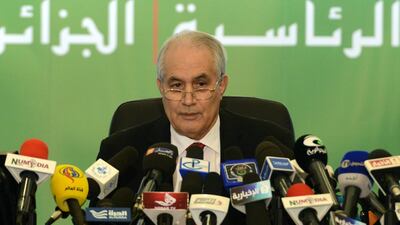The chairman of Algeria's Constitutional Council, Tayeb Belaiz, resigned on Tuesday, state news agency APS said.
Mr Belaiz submitted his resignation to interim president Abdelkader Bensalah, the agency said, citing a statement from the council.
The 70-year-old Mr Belaiz is the former justice minister and a judge. He previously chaired the constitutional council from March 2012 to September 2013.
Mr Belaiz faced calls during his tenure for the council to initiate legal procedures to rule whether the 82-year-old Abdelaziz Bouteflika was capable of remaining in office after he suffered a stroke and was hospitalised in France for 80 days in 2013.
Mr Belaiz left the council to become interior minister, and in 2015 became a special adviser to Mr Bouteflika.
When he retook the position at the head of the constitutional council in February, he replaced Mourad Medelci who died in January from an illness at the age of 76.
Composed of 12 members, the constitutional council is responsible for validating presidential candidates in elections, controlling and monitoring polls, and announcing the final results.
Four members of the council, including its head and deputy, are appointed by the president, two are elected by each of the two houses of parliament, two by the Supreme Court and two by the state council.
The protesters who forced the 82-year-old president from office on April 2 have also called on Mr Belaiz to step down. Demanding wider democratic changes, many on the streets see those in senior positions as part of the system that Mr Bouteflika embodied.
As called for by the Algerian Constitution, the president’s ally Abdelkader Bensalah was appointed the interim leader for a maximum of 90 days until a new election can be organised.
He cannot run for president himself when the election is held and members of the opposition abstained from the vote on April 9.
Alongside Mr Bensalah and Mr Belaiz, Prime Minister Noureddine Bedoui was appointed to a key post by Mr Bouteflika before he was forced to step down.
Protesters have dubbed the trio the “three Bs” and called on them to stand aside to pave the way for new figures to rise up.
"Out with Bensalah, Belaiz et Bedoui!" protesters have shouted at numerous rallies in Algiers.
Mr Bensalah, 77, has cultivated a low-key profile despite holding numerous positions over the past quarter-century. With a career as a devoted public servant, he has no political weight, and his powers as the transitional leader are reduced.
Mr Bedoui has a starkly different profile. He was among the early promoters of a fifth mandate for the ailing Mr Bouteflika – the trigger for the crisis that started on February 22. Mohamed Saidj, a political science professor, says that as interior minister Mr Bedoui also was behind a move to try and stop doctors and human rights organisations from protesting.

